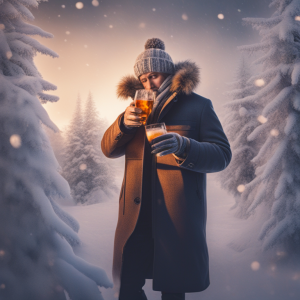Understand the Significant Dangers of Alcohol Consumption in Freezing Weather
As we endure the challenging conditions of winter, particularly in extremely cold climates, many people instinctively seek warmth and comfort through the consumption of alcohol. However, it is crucial to recognize the serious risks associated with this choice. This article will delve into the dangers of drinking alcohol in frigid environments, illustrating why this habit not only poses significant health risks but also fails to effectively maintain body warmth. By enhancing your understanding of these dangers, you can make informed choices that prioritize your safety and overall well-being during the treacherous conditions of winter, ensuring you remain safe and healthy during the cold months.
Before exploring the associated dangers, it is important to address the widespread misconception that alcohol serves as a warming agent. When consumed, alcohol leads to the dilation of blood vessels close to the skin's surface, which may create an initial, misleading sensation of warmth. While this feeling can be comforting, it does not meet the essential requirement for sustaining a stable internal body temperature. In reality, the effects of alcohol can be detrimental, compromising your ability to withstand cold weather and significantly increasing the risk of experiencing severe conditions such as hypothermia and other serious health complications that can arise from prolonged exposure to low temperatures.
 One of the most pressing hazards associated with drinking alcohol in cold climates is the heightened risk of dehydration. Alcohol acts as a potent diuretic, promoting increased urine production, which leads to significant fluid loss from the body. Additionally, the cold air prevalent in winter conditions tends to be drier, causing our bodies to lose moisture at a faster rate in these environments. When these elements combine, it can result in dangerously low hydration levels, which are vital for maintaining optimal health and survival. Dehydration negatively impacts not only physical performance but also cognitive functions, making it increasingly challenging to think clearly and make rational decisions in critical situations where sound judgment is paramount.
One of the most pressing hazards associated with drinking alcohol in cold climates is the heightened risk of dehydration. Alcohol acts as a potent diuretic, promoting increased urine production, which leads to significant fluid loss from the body. Additionally, the cold air prevalent in winter conditions tends to be drier, causing our bodies to lose moisture at a faster rate in these environments. When these elements combine, it can result in dangerously low hydration levels, which are vital for maintaining optimal health and survival. Dehydration negatively impacts not only physical performance but also cognitive functions, making it increasingly challenging to think clearly and make rational decisions in critical situations where sound judgment is paramount.
Recognize How Alcohol Impairs Judgment and Awareness in Cold Weather
Another crucial consequence of alcohol consumption is its detrimental effect on cognitive function and decision-making skills. In survival scenarios, the ability to make clear, rational decisions is paramount for ensuring personal safety. Alcohol can cloud judgment, increasing the difficulty of responding appropriately to potential hazards. This impaired reasoning can lead to accidents and poor choices, which can have particularly dire consequences when faced with extreme cold. Maintaining vigilance and awareness of your surroundings is essential; however, alcohol undermines this critical necessity, resulting in a greater likelihood of mistakes that could jeopardize your personal safety and health in hazardous winter conditions.
Moreover, alcohol significantly disrupts the body's natural ability to regulate its temperature. Upon consumption, alcohol causes blood vessels in the skin to expand, leading to accelerated heat loss. Although this may initially produce a fleeting sensation of warmth, it ultimately speeds up the loss of core body heat, which is vital for survival in cold temperatures. This creates a dangerous cycle where the temporary warmth lulls individuals into a false sense of security, leading to a rapid decline in core temperature and increasing the risk of life-threatening conditions such as hypothermia. It is essential to understand that while alcohol may seem like a quick solution to feeling cold, it ultimately heightens vulnerability, making it a poor choice in freezing environments.
Explore the Critical Connection Between Hypothermia Risk and Alcohol Consumption
When discussing the risk of hypothermia, it is vital to comprehend how alcohol consumption can obscure the early warning signs of this perilous condition. Hypothermia occurs when the body's core temperature drops below the normal range, typically falling below 95 degrees Fahrenheit (35 degrees Celsius). Symptoms may include shivering, confusion, fatigue, and reduced coordination. However, alcohol suppresses our body's natural responses, making it increasingly challenging to recognize these critical indicators. By the time the signs of hypothermia become apparent, it may already be too late to avert serious injury or even life-threatening consequences. Awareness of this connection is crucial for anyone who might find themselves in extreme cold.
In winter survival situations, there are numerous safer and more effective alternatives to alcohol for maintaining body warmth. Here are some strategies that can significantly enhance your ability to stay warm and safe:
1. Dress in Layers for Optimal Warmth: Wearing multiple layers of clothing is essential for effectively trapping warm air. Begin with thermal base layers, add insulating mid-layers, and finish with a windproof and waterproof outer layer to create a protective barrier against the cold.
2. Keep Your Clothing and Footwear Dry: Moisture can lead to rapid heat loss, so it’s crucial to ensure that your clothing and footwear remain dry at all times. Opting for waterproof materials and changing into dry garments whenever necessary can greatly assist in maintaining warmth and preventing cold-related health risks.
3. Insulate Yourself from the Cold Ground: Utilizing sleeping mats or insulation pads can significantly reduce heat loss, particularly during sleep. This step is critical for conserving body heat during extended periods spent in cold environments, ensuring you remain warm and safe.
4. Opt for Warm, Non-Alcoholic Beverages: Instead of resorting to alcohol, consider indulging in hot beverages like tea, coffee, or hot chocolate. These drinks provide warmth without the adverse side effects associated with alcohol consumption, making them a much wiser choice in cold weather.
5. Find or Build Shelter to Protect Yourself: Actively seeking out or constructing a shelter can significantly reduce your exposure to harsh winds and freezing temperatures. A well-built shelter plays a crucial role in retaining body heat, greatly enhancing your chances of staying warm and safe in the winter.
6. Fuel Your Body with High-Calorie Foods: Consuming nutrient-dense foods that are high in calories can provide your body with the energy necessary to generate heat. Foods such as nuts and fatty fish are excellent sources of healthy fats that can be particularly beneficial for maintaining warmth during cold conditions.
Understanding the dangers associated with alcohol consumption in freezing temperatures is vital for anyone involved in winter survival scenarios. Despite the temporary sensation of warmth it may provide, alcohol can result in dehydration, impaired decision-making, hindered temperature regulation, and can mask the symptoms of hypothermia. By avoiding alcohol and implementing effective, safe strategies, we can significantly improve our chances of surviving and thriving in harsh winter environments. Stay vigilant, prepare thoroughly, and prioritize your safety above everything else to enjoy a secure winter experience.
The post Hazards of Alcohol Consumption in Extreme Cold Conditions appeared first on Survival Bite.
The Article Alcohol Consumption Hazards in Extreme Cold Conditions Was Found On https://limitsofstrategy.com


This is such an important topic to address, especially as winter approaches and many people may be inclined to reach for a drink to combat the cold. I once read a study highlighting that while alcohol may give a fleeting sense of warmth, it actually increases the risk of hypothermia because of its effects on blood circulation. This misconception can lead to dangerous situations, particularly for those who might be outdoors for extended periods.
You’ve hit on such a crucial point here, and it’s one that often flies under the radar. As the chill of winter really settles in, many folks instinctively think of cozying up with a drink, but it’s essential to unpack what that really means for our bodies. The way alcohol affects our circulation can create this false sense of warmth, which might sound comforting on the surface. But when you step outside into that biting cold, that feeling can vanish quickly, and what follows isn’t quite what we hoped for.
You’ve raised a vital point that a lot of folks overlook during those cold winter months. It’s easy to think that a warm drink, especially one with alcohol, will wrap us in comfort when the temperatures drop. The way alcohol dilates blood vessels can actually lead to a quick feeling of warmth, but it can certainly fool us into a false sense of security about how our bodies are really handling the cold.